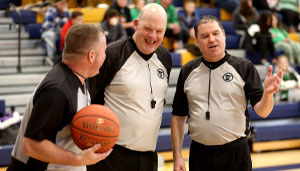What would you rather have, a team full of talent with poor attitudes, or a team with low talent and great attitudes? For some this may be a difficult choice, but for the majority of coaches the choice is easy. I’ll take the team of great attitudes over talent. In the end, talent will only take you so far. But a positive attitude will open many doors.
All coaches want talented players. At the high school level, talent is not always under the control of the coaches. Attitude is much more under the control of the coach than talent level is. Talent can win you games, but character and attitude win championships. Coaches would rather invest their time in a group of athletes who are motivated, coachable, hard-working, disciplined and great teammates over a selfish group of talented athletes.
“Attitude and chemistry are the factors that can kick people up to higher levels of winning, no matter what talent they have.” - Coach Jerry Wainwright
A bit of advice for all the players out there: Coaches will select players with less talent but who have more dedication to the team over a selfishly talented individual.
As mentioned previously, attitude is under the control of the coach. In order to foster a positive team attitude and culture, the coach needs to establish the standards to which all players will be held and communicate them clearly. When the team is selected these values and standards must not be overlooked simply because of a player’s talent level. If there are any players who have attitude or behavior problems, the coach should work on addressing them prior to try-outs. A coach should never just ignore the issue and hope the player resolves it on their own. If a coach makes a valid attempt to help the player and the player refuses to change, that player must be let go. No one individual is above the team, and the team’s attitude and culture should not be compromised for one individual.
Players should strive to show commitment to their teammates. By doing so, they are illustrating a positive team-first attitude. Players must have a great work ethic and show that they are coachable. A player can illustrate this by looking their coach in the eye, displaying good body language, following instructions, and serving as an extension of the coach on the floor.
Coaches absolutely must surround themselves with high energy people. There can’t be any people who drain the energy of the team allowed to associate with it. Just being positive is contagious, but so is a negative attitude. Simply put, bad attitudes from players, coaches or staff cannot be tolerated.
Being positive is a choice and teams take on the personality of their head coach. The responsibility of creating a great team attitude and culture falls on the head coach. Coaches must consciously make the effort to teach character and positive attitude. Teams develop character and a positive attitude when teammates play for each other. How do you get teammates to play for each other? One suggestion is to build a culture of service. Teach your players what servant leadership is. Make it a point for upperclassmen to serve and mentor your younger players. Have the upperclassmen welcome the freshmen to the team with a round of applause in front of all programs. Another idea is to assign each upperclassman a freshman with whom they will serve as a mentor for. Then by the time your freshmen are upperclassmen they know what is expected of them and how to effectively serve their teammates.
It always bears repeating, “That which gets praised, gets repeated.” If we want athletes to have a positive attitude, we must catch and praise them when they display it. Positive cultures exist because they are a priority. There can be no gray area, and by consistently praising athletes who exemplify the desired standards coaches will continue to build the foundation for a positive team culture.
Lastly, coaches must display and serve as a role model for the behavior they expect. There can be no contradictions. Once a coach fails to live up to the standards expected of the athletes, the culture begins to crumble. Trust is of the highest importance and should never be taken for granted. If the coaching staff lives to the program expectations and always displays a positive attitude, the players will fall in line, and the programs culture will rise.
Kyle Elmendorf
Kyle Elmendorf is in his tenth year as a teacher and coach at Orchard Farm High School in St. Charles, Missouri. He is the head girls basketball coach and assistant football coach.
Most Recent Articles
- nfhs news NFHS Learning Center Delivers 25 Millionth Course
- Track & Field/Cross Country article Effective Communication with Athletes and Coaches
- nfhs news Player Equipment Changes Highlight 2025 High School Football Rules Revisions
- Player Equipment Changes Highlight 2025 High School Football Rules Revisions
- nfhs news Judgment Call on Second Contact Eliminated in High School Volleyball






